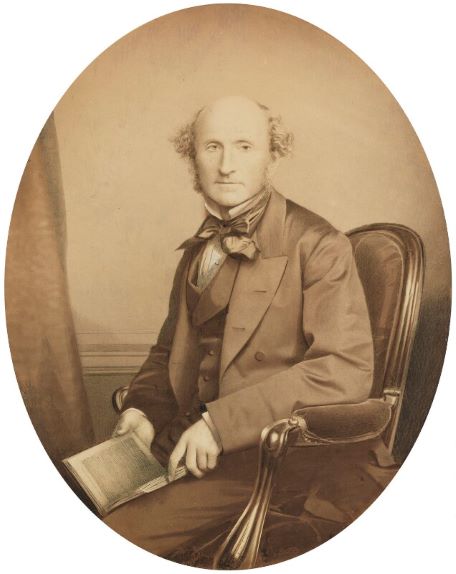Liberty Matters
What Did Mill Understand as “Socialism”?

The question of Mill’s relation to socialism continues to puzzle scholars. There are good reasons for this. Mill described himself in the Principles of Political Economy as an “Ideal Socialist,” but later wrote in the Chapters on Socialism (1879) a scathing critique of socialism.[51]
The term “socialism” came into use around 1830 and was applied to three movements deriving respectively from Saint-Simon (1760-1825), Fourier (1772-1837), and Robert Owen (1771-1858) in England. These writers, referred to as “Utopian” Socialists, are the ones that Mill discussed most thoroughly and always had in mind. Saint-Simon himself (and later Auguste Comte) proposed having the entire social world organized and run by a technical elite. The society would be a thoroughgoing meritocracy. Fourier was a proponent of a workers cooperative consistent with private ownership of property and prices set by a market. Other French figures who influenced Mill’s thinking on socialism were Pierre-Joseph Proudhon (1809-1865), advocate of producer’s cooperatives without centralized control and Louis Blanc (1811-1882), another advocate of worker cooperatives, initially funded by the government, but thereafter independent of government control.
Utopian Socialism is the kind of socialism Marx and Engels rejected. In explaining why their manifesto was “Communist” and not “socialist,” Engels said:
By socialists, in 1847, were understood, on the one hand, the adherents of the various utopian systems: Owenites in England, Fourierists in France, both of them already reduced to the position of mere sects, and gradually dying out; on the other hand, the most multifarious social quacks, who, by all manners of tinkering, professed to redress, without any danger to capital and profit, all sorts of social grievances, in both cases men outside the working-class movement and looking rather to the ‘educated’ classes for support…. Thus socialism was, in 1847, a middle-class movement, communism a working class movement.[52]
Utopian socialists were critical of what capitalism meant in the 19th century: (1) the assumption that human beings were primarily motivated by self-interest narrowly understood; (2) a permanent (and adversarial) division in society between two classes: owners and workers; and (3) the assumption that class membership was determined exclusively by birth. Capitalism in the 20th and 21st centuries has come to mean something very different. In the contemporary context utopian socialists would not be considered socialists but capitalists. Marx and Engels would have understood this.
Mill identified with the utopian socialists. What this meant, first, is that he rejected psychological hedonism and egoism. Fourier was the great exponent of the idea that the natural passions properly directed (self-interest properly understood -- Tocqueville) resulted in social harmony. Second, Mill advocated cooperatives. Mill’s “socialism” is the doctrine that workers should pool their savings and borrow on the open market in order to set up cooperatives, and everyone in a cooperative should be shareholders (Silicon Valley startup?) Associations of individuals who own property, e.g., modern corporations, would be “socialistic” in Mill’s sense, but not in the contemporary context. The world in which Mill lived was one in which property was largely owned by a few individuals but primarily by families. Until 1855, Parliament had proscribed all but a few limited liability joint-stock companies. I note as well that Mill anticipated Hayek in maintaining that no one could foresee the future permutations of a market economy.
Endnotes
[51.] The Collected Works of John Stuart Mill, Volume V - Essays on Economics and Society Part II, ed. John M. Robson, introduction by Lord Robbins (Toronto: University of Toronto Press, London: Routledge and Kegan Paul, 1967). </titles/232#lf0223-05_head_048>.
[52.] Friedrich Engels, "Preface to the 1888 English Edition", Manifesto of the Communist Party (1848). Online at <https://www.marxists.org/archive/marx/works/1848/communist-manifesto/preface.htm>.
Copyright and Fair Use Statement
“Liberty Matters” is the copyright of Liberty Fund, Inc. This material is put on line to further the educational goals of Liberty Fund, Inc. These essays and responses may be quoted and otherwise used under “fair use” provisions for educational and academic purposes. To reprint these essays in course booklets requires the prior permission of Liberty Fund, Inc. Please contact oll@libertyfund.org if you have any questions.